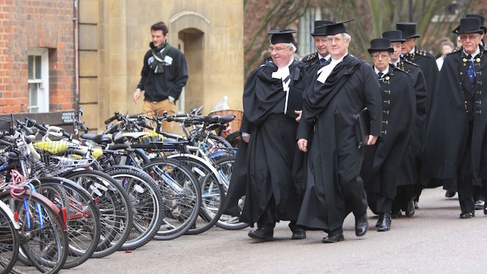What do we do?

The Proctors are University Officers nominated by the Colleges and elected by the Regent House. They are independent of the University administration but are members of the Board of Scrutiny and other Syndicates and Committees, and they attend meetings of the University Council as observers. The Proctors manage business at Congregations of the Regent House, including degree ceremonies, and they represent the Regent House at University Sermons and other public occasions.
Traditionally responsible on behalf of the Regent House for seeing that the Statutes and Ordinances are observed, the Proctors are particularly concerned with protecting lawful free speech and also with maintaining order at University events. The Junior Proctor has particular responsibilities in connection with University Clubs and Societies and with the Students’ Union.
The Proctors are assisted by Pro-Proctors and Deputy Proctors, and by University Constables appointed by the Vice-Chancellor under the Universities Act 1825. Within the precincts of the University and four miles around, the Constables have the legal powers of any constable—as, for the maintenance of discipline among the members of the University, do the Proctors and Pro-Proctors—and it is an offence to assault or obstruct them in the execution of their duties.
Historically, the Proctors had extensive executive, financial, administrative and disciplinary duties. Over the centuries, many of these duties have been discontinued or transferred elsewhere within the University. Even so, the Proctors today fulfil a varied range of functions, as representatives of the Regent House, the University’s governing body.
The Proctors’ early duties
The earliest manuscript we have of the Statutes of the University of Cambridge, the “Angelica MS 401” manuscript (c. 1236–54), goes into some detail about the Proctors (or “Rectors”) and their duties. The section De officio rectorum describes various duties, such as assessing the values of houses, ensuring that bread and wine and other essential foods are sold at a fair price and not subject to agreements between tradespersons to fix an artificially high price.
The Proctors also disciplined errant members of the University:
...et in Uniuersitate male factores inobedientes et contumaces per se et per alios diligenter inuestigent, ut eorum nomina referant Cancelario grauiter puniendorum
...and [the Proctors must] be diligent in seeking out by themselves, or through others, those in the University who are evil-doers, disobedient, and stubborn, sending their names to the Chancellor for severe punishment
The earliest surviving financial accounts, from the 14th century, were also kept by the Proctors, who continued, with the Vice-Chancellor, to keep the university accounts until the 1880s. In pre-Reformation days, they were also responsible for the due observance of official exequies and other religious services. Apart from the regulation of rents, some of the Proctors’ earliest recorded duties also continued into the nineteenth century: the supervision of the market ended only in 1850s, and the ordering of lectures and disputations evolved into the conduct (later assisted by Moderators) of University examinations.
This last was part of the Proctors’ function as the representatives of the Regent House, the body of teaching masters, and the chief legislative body of the University, whose meetings they could under certain circumstances convene. They had custody of the University Statutes—not the obsolete ones that they still symbolically carry but two succeeding manuscript copies, for many years the only existing versions, which they personally updated, even after the first printing of them in 1785, and which they “personalised” with their signatures and with competitive epigrams, written in any available space. The bindings were heavily armoured so as to survive affrays.
On the introduction of the Elizabethan statutes of 1570, which shifted power from the Regent Masters to the Caput (the predecessor of the present University Council, consisting of the Vice-Chancellor, one Doctor of Divinity, one of Law and one of Physic (medicine), the senior Non-Regent and the senior Regent Master), including the power to put (and to veto) Graces, it was the Proctors who led the protests, not least because many of their powers were then curtailed. It is as representatives of the Regent House that Proctors today, whatever their academic degree, wear MA hoods when on duty.
The Proctors were, of course, also responsible for discipline both of members of the University in statu pupillari (which included all those under the degree of MA) and, notoriously, until 1894, for policing of street-walkers, whom they could commit overnight to the Spinning House pending the Vice-Chancellor’s sentence the next day. They continued to walk the streets with their constables (“bulldogs”) until 1965, on the lookout for gown-less undergraduates out after dark and fining them on the spot. After the Garden House riot in 1970, the Proctors voluntarily resigned their authority to do such things.
The Proctors’ duties today
The current Statutes and Ordinances are much more reticent than those of earlier centuries, going into considerable detail of how the Proctors are elected but saying little about what we do.
Clearly, we no longer seek out monopolists and cartels; nor do we prowl the streets after dark with our Constables looking for women suspected of evil. However, we retain important and varied functions, principally in connection with University governance and ceremonial.
With thanks to Elisabeth Leedham-Green, Senior Proctor 2003–2004.
